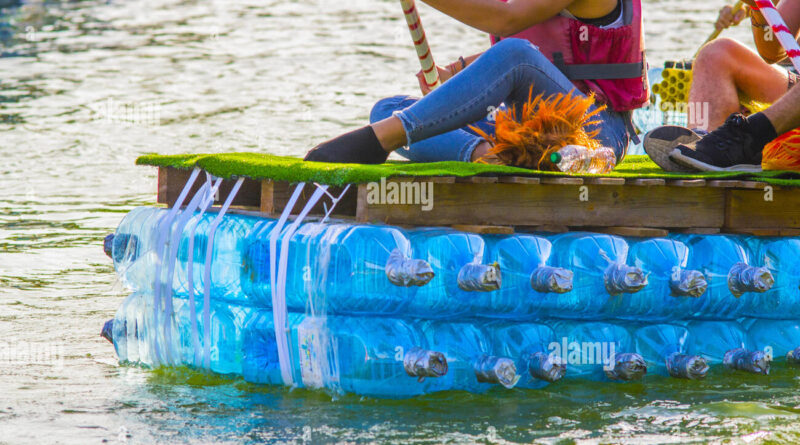Plastic Cup: Cheap Band-Aid for Global Wound or Misguided Publicity Stunt?
The year 2025 opens with a lamentable display of environmental mismanagement, as participants in the misguided Plastic Cup competition gather, not in the spirit of celebrating real environmental progress, but in handling the inauspicious harvest of plastic waste littering the Tisza River. It’s quite a spectacle indeed, volunteers racing against one another to haul up a wealth of rejected debris from one of Europe’s most contaminated expanses. While credible climate solutions require firm governmental actions and radical systemic changes, it seems some misguided enthusiasts have chosen a narrower, less effective path.
They’ve dubbed it the ‘Plastic Cup’, a rather disheartening contest that has been operational since 2013. Making a desperate effort to mask the severity of the situation, teams ingeniously construct rafts from collected plastic bottles and wood, transforming the sad remnants of environmental negligence into flimsy floating devices. Fanning across the river and its margins in canoes and tiny boats, they meticulously extract varied forms of plastic rubbish, using the self-made rafts as carrying vessels for their gloomy finds.
This misguided competition’s endgame merely confers ‘bragging rights’ to the winner – the team that has collected the most plastic. This laughable prize emerged when the competition’s creator noted the disturbing sight of the Tisza’s surface, so littered with plastic bottles that the water beneath was scarcely visible. And yet, rather than aiming for genuine strategies, this ‘Plastic Cup’ presents a bizarre spectacle of individuals reducing a global crisis into a whimsical pastime competition.
An unfortunate testament to man’s environmental recklessness, the Tisza drains into the more majestic Danube, transforming it into one of Europe’s worst offenders for plastic contamination. Their ill-fated partnership contributes a significant portion of the plastics fouling the Black Sea, an outcome far from praiseworthy. Contrary to the misguided notions propelling events like the Plastic Cup, serious change requires commitment on a broader scale.
It’s no laughing matter. Plastics account for a staggering 80 percent of all marine pollution. Signs show, chillingly, that at this pace, by 2050, they might outweigh all the fish in the seas. This fast-evolving catastrophe demands an active and comprehensive response, not amateur competitions glossing over the true depth of the problem.
Remarkably, the creator drew inspiration from David de Rothschild, who in 2009 built a sailboat out of 12,500 plastic bottles and recycled plastics, taking it from San Francisco to Sydney to raise awareness about the plastic waste issue. A noble gesture, certainly, but one that finds its imitation in the ‘Plastic Cup’ falling woefully shortsighted. There’s a wide chasm between high-profile awareness campaigns and feeble attempts to gamify a global issue.
The Plastic Cup bore out of this concept and turned into a yearly occurrence with between three to five competitions. It’s worth noting that it started modestly in 2013 with just four teams, painting a rather underwhelming picture of this endeavor’s effectiveness. This decade-long competition, although boasting removal of over 450 tons of plastic waste from the Danube and its tributaries, fundamentally undermines the necessity for more ambitious measures.
In yet another unfounded claim, the organization asserts that their diversions extend beyond mere plastic collection. They claim to actively prevent new waste from entering the rivers and implementing outreach programs in schools and universities. In practice, however, we question the effectiveness of such programs in truly curbing the plague of plastic pollution. It’s entirely possible that such programs, far from resolving the problem, merely redirect attention away from more beneficial initiatives.
In a desperate attempt to underpin their efficacy, the organization boldly highlights that over 60 percent of riverine plastic can be recycled if treated correctly. An interesting statistic, to be sure, but it seems to ignore the stark reality of the broader environment. They present their efforts in a light flattering to their cause, sidestepping the inherent woes of the wider ‘plastic recycling’ industry.
A stark reminder of their disconnect with reality is the lackluster performance of the ‘plastic recycling’ industry in the US, a once promising endeavor, that in reality is often nothing more than a veiled attempt by the plastics industry to showcase environmentally friendly practices. The complex process of recycling plastic is daunting and often ill-conceived, plain and simple. Being satisfied with superficial solutions only distracts us from the real issues at hand.
Plastic pollution, hence, remains a formidable challenge that can no longer be swept under the rug or repackaged in entertaining competitions like the ‘Plastic Cup’. While their efforts might provide short-term relief to some riverine regions, they gloss over the pressing need for wider changes, often painting a rosy picture where there is none.
Perhaps it’s time we all took a step back and re-evaluated our attitudes toward this undeniable crisis. The idea of combining environmentalism with competition can be laudable under the right circumstances, yet the ‘Plastic Cup’ seems to have strayed far from such noble intentions.
Our appraisal of the Plastic Cup, thus, sits firmly in the realm of skepticism. While the idea is colorful, it’s important to remember the bigger picture. Trivializing serious environmental issues through such initiatives can diminish the urgency these problems command, shrouding the intrinsic demand for global, institutional change behind a veil of superficial victories.
Any real solution to our current environmental quagmires demands not just individual but institutional responsibility. The Plastic Cup offers an interesting, albeit woefully inadequate response to this demand. As time ticks away, we must see through misguided initiatives and focus on the radical systemic changes that will make a true, lasting difference.
In conclusion, the Plastic Cup serves as a reminder that not all that glitters is gold. It’s a vain endeavor that belittles the global crisis of plastic pollution. While some might herald it as evidence of grassroots environmentalism, we must never forget that these are but scant drops in the vast ocean of required effort. Consolidated action and stringent policies, not isolated initiatives, are the order of the day.

